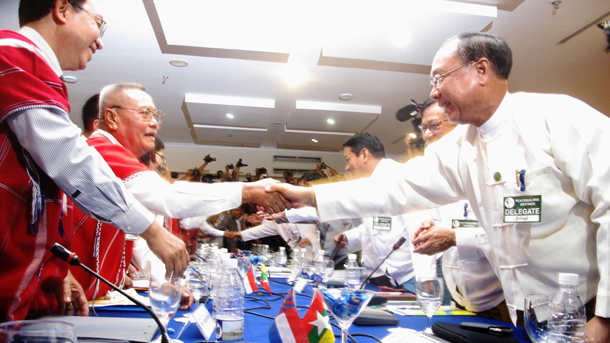Leaders of the Karen National Union (KNU) expect to meet with a Burmese government peace delegation in June, when the ethnic group hopes hammering out a “code of conduct” agreement will top the agenda.
Saw Kwe Htoo Win, general secretary of the KNU, said that before a meeting with leaders of the KNU and the government’s peace delegation, a KNU technical team would meet with representatives of the government’s technical team to prepare the talks’ agenda items, including a code of conduct agreement.
“We formed a technical team to arrange talks with the government’s technical team. We have to see the results of the technical teams’ meeting first. And policy makers will meet again hopefully in June,” Kwe Htoo Win said.
He said the KNU peace delegation had missed a chance to meet with the government peace team as planned in early May because Naypyidaw’s negotiators were unavailable.
He said the government had not provided a reason for its absence, but added that KNU representatives were aware that the government peace team had been busy with arrangements for other meetings with the rebel Kachin Independence Organization (KIO) and the All Burma Students’ Democratic Front (ABSDF), an exile armed Burmese dissident group.
“We missed a meeting 20 days ago. They didn’t give any reason, but we understood that they were busy with upcoming meetings with the Kachin, ABSDF and other organizations,” Kwe Htoo Win said.
Karen sources close to the KNU leadership, however, said the government delegation may have skipped the meeting knowing that the KNU planned to talk about implementing a code of conduct, which both government and KNU troops would be obliged to obey.
Among other provisions, a code of conduct agreement would likely require that government troops in KNU-controlled areas be repositioned and some potentially withdrawn.
One source close to the KNU leadership who asked not to be named said the government’s absence in early May would harm the trust-building process between the two parties and could also imperil the ceasefire deal and peace process going forward.
“Actually we don’t have peace yet. The main two points are a code of conduct and government troop withdrawal. So, there is no concrete action on that so far. We have to try very hard for trust-building,” the source said.
The KNU has fought one of the longest enduring ethnic rebellions in Southeast Asia. It has struggled for greater autonomy from the central government for more than 60 years, but signed a ceasefire agreement with Naypyidaw in January 2012.
After the ceasefire agreement, it opened six liaison offices. It now has representation in Kyaukkyi, Pegu Divison; Dawei in Tanesserim Divison; Thaton in Mon State; and Three Pagodas Pass, Myawaddy and Pa-an in Karen State.

















